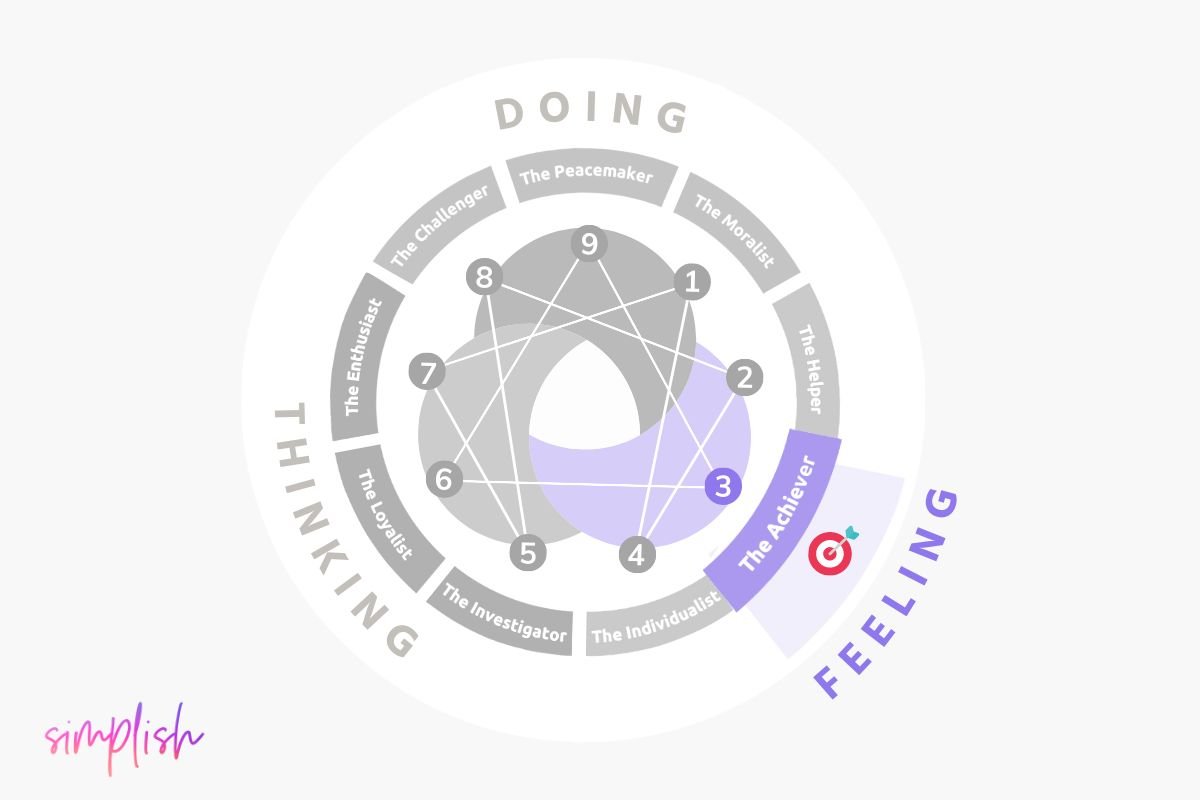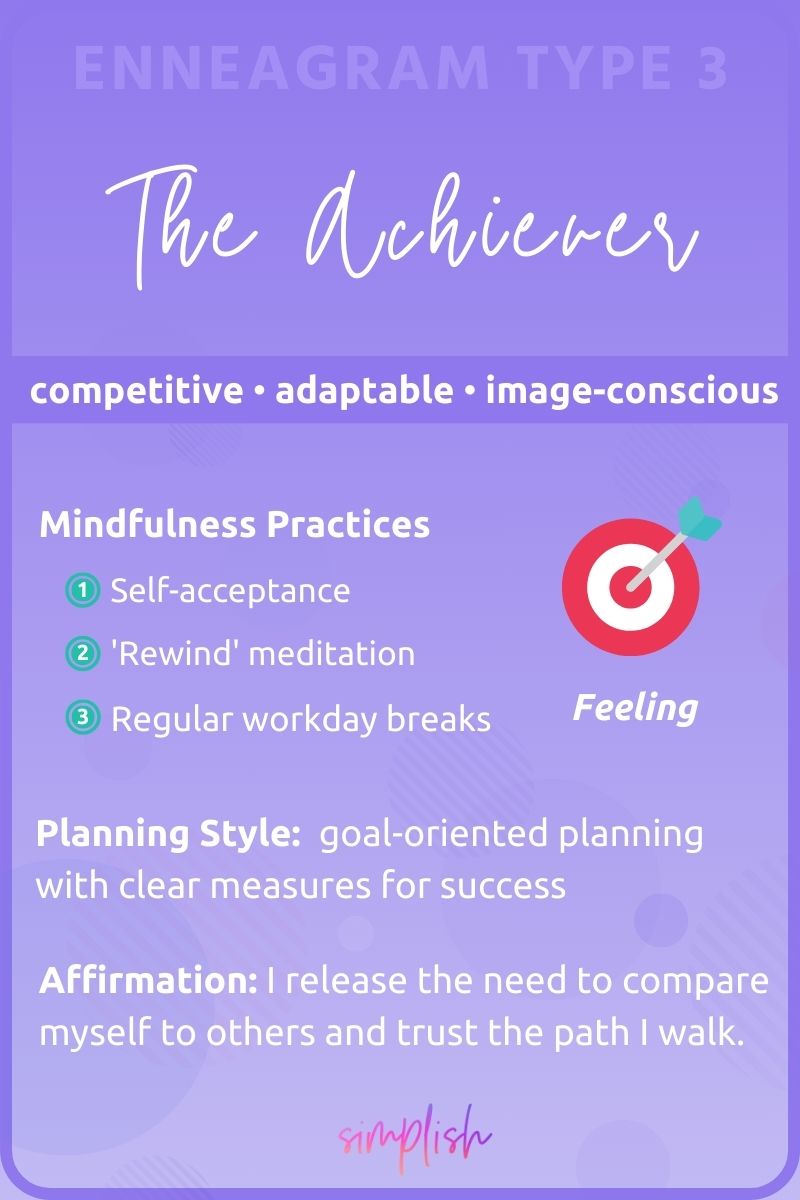Enneagram Type 3: The Achiever
Why simply do well when you can be the best? This is the driving motivation behind people who identify as Enneagram Type 3s, commonly known as The Achiever or The Performer personality archetype. Achievers are driven and success-oriented people who are motivated by competition to consistently perform at the highest level.
If you identify as Type 3, understanding your core fears and desires can prevent you from becoming overly fixated on external measures of success and channel your drive towards balanced, healthy relationships to support long-term well-being.
Here are the basics of the hardworking Achiever archetype in a nutshell:
Motivation: Feeling accepted and valued in their social circle is the core motivation of the Type 3 enneagram, who typically strive publicly for achievements to meet this end. They are highly motivated by external measures of validation and thrive under pressure.
The Struggle: Average threes tend to struggle with perfectionism, often obsessing over comparing themselves to others in pursuit of prestige, promotions, and an impeccable image. Achievers find it difficult to follow their inner compass above paths defined by external validation, generally viewing introspective practices as a waste of time.
The Win: When healthy Type threes take the time for self-inquiry and find it within themselves to reject societal standards that don't align with their core values, they become unstoppable innovators. Ironically, the more Type 3s reject external validation and focus on their own passions and goals, the more successful they tend to be!
Enneagram Type 3 Overview
Enneagram Type threes are the "stars," role models, and fearless leaders people often admire for their style and personal achievements. Type threes live for the kudos gained by contributing their talents and abilities to the world at large.
Among the nine enneagram personality types, type threes are perhaps the most disciplined and growth -oriented, measuring their own value in terms of self-development by consistently setting and achieving goals.
Achiever types wither outside the spotlight, where their fear of being forgotten can make unhealthy threes power-hungry and vengeful. They might also fear being useless, mistakenly viewing success as the only way they can meaningfully contribute to society.
The two variations of this driven archetype are the three two wing (3w2), sharing characteristics of The Helper, and the three four wing (3w4), with traits of the cIndividualist.
“The Charismatic Achiever” 3w2; social, compassionate and highly outgoing
“The Creative Achiever” 3W4; introspective with a clear personal vision and impressive creative abilities
In general, Achievers are recognized by a few key personality traits that set them apart from others:
Highly competitive: Threes set ambitious standards for themselves, consistently outdoing their peers and achieving better results than those around them. Type 3s are driven by a desire to achieve success, often setting goals to beat their competitors or their own personal best.
Hard-working: Enneagram type 3 are willing to work long hours and make sacrifices to achieve their desired outcomes.
Fuelled by glory and recognition: Type 3s are highly concerned about external validation and are motivated by the glory and praise they receive for their achievements.
Type 3 Habits, Addictions and Guilty Pleasures
Type 3s are all about self-improvement, and a daily habit like working out is no exception. Achievers' strong work ethic can lead to burnout when competition is fierce - though they’ll often be the last to admit failure, relying on perceptive loved ones to step in when their anxiety-driven perfectionism gets out of hand.
Unsurprisingly, Type 3s can form unhealthy habits fuelled by their all-or-nothing ambition, making them prone to workaholism, substance abuse, and social media obsession. The
Type 3s often benefit from simple indulgences that bring them down to earth and help them recharge, like watching TV, shopping, and traveling for pleasure. Balancing ambition with personal well-being is key to help Type 3s develop long-term success and happiness.
Type 3 Productivity & Planning Style
Type 3s are great at planning and prioritizing their goals, often breaking them down into manageable steps. They love to set themselves up for success and will create a plan of action to achieve their objectives.
However, enneagram Type 3s often resist making time for the important things in life that are difficult to measure, like quality time with friends and family, activities that deepen spiritual connection, and creative expression that isn’t geared toward professional achievement, like journaling.
Overall, Type 3s are productive and proactive, always looking for ways to improve themselves and their circumstances.
Purposeful Practices for Enneagram Personality Type 3
For Enneagram Type 3, sitting down to meditate on their own emotions or recite affirmations might seem like a waste of precious time. But Purposeful Practices allow them to take a break from striving and just be present at the moment.
It's a chance to embrace who they are and not have to work on being better all the time. Carving out time for purposeful practices can bring balance into your life as healthy threes.
Some Type threes may be skeptical or afraid of "doing it wrong," while others may be too busy to commit to regular practice. However, making time for mindfulness and self reflection can help Type 3s slow down, reflect on their goals, and prioritize self-care.
It can also help them build self-awareness and better understand their motivations and values. By embracing purposeful practices, Type 3s can become more present, fulfilled, and successful.
Type 3 Mindfulness Tips
Practice self-acceptance. Type 3s can be hard on themselves when they don't achieve their goals or make mistakes. By practicing self-compassion, you can cultivate a more positive relationship with yourself and reduce self-criticism.
“Replay your day” meditation. Achievers can benefit greatly from reflecting on their accomplishments in progress rather than always focusing on the results of their goals. This practice helps build perspective around what is truly important to them, rather than the results that others tend to value. A simple 10-20 minute meditation to exercise this perspective is the “replay your day” meditation, where you slowly - and without judgment - walk through the last 24 hours of your day.
Take regular breaks. Everyone needs to take breaks, but Achievers especially! Resting the mind by focusing on the senses is a powerful way to bring awareness into the body and present experience. Mindful breaks don’t need to be complicated - but Achievers may enjoy guided relaxation or body scan exercises to recharge deeply.
Type 3 Affirmations
I am worthy of love and respect regardless of my achievements.
I choose to prioritize self-care, my own feelings, and balance in my life.
I release the need to compare myself to others and trust the path I walk.
I am capable of achieving my goals without sacrificing my well-being or relationships.



